Throughout the whole Speed competition, one thought kept repeating to me: Speed climbing and the Olympics are made for each other.
Speed climbing is going to be the fastest sport in the Olympics in Paris 2024, and the Olympics are going to love it. Shanghai showed the full spectrum, from the drama that started with a false start on the first race, disqualifying the athlete just like in Athletes, to races separated by one-hundredth of a second. Then we get a race separated by one-thousandth of a second. We got to see the first sub-4.90 race. We had falls, recoveries, and everything else that makes Speed such a captivating sport.
The crowd for Speed was packed, cheering on the full complement of Chinese athletes in both male and female finals. The crowd had plenty to cheer for. Zhou Yafei surprised by winning the female competition ahead of Raj’iah Sallsabillah, Wu Peng came second behind Veddriq Leonardo, and Wang Xinshang finished third.
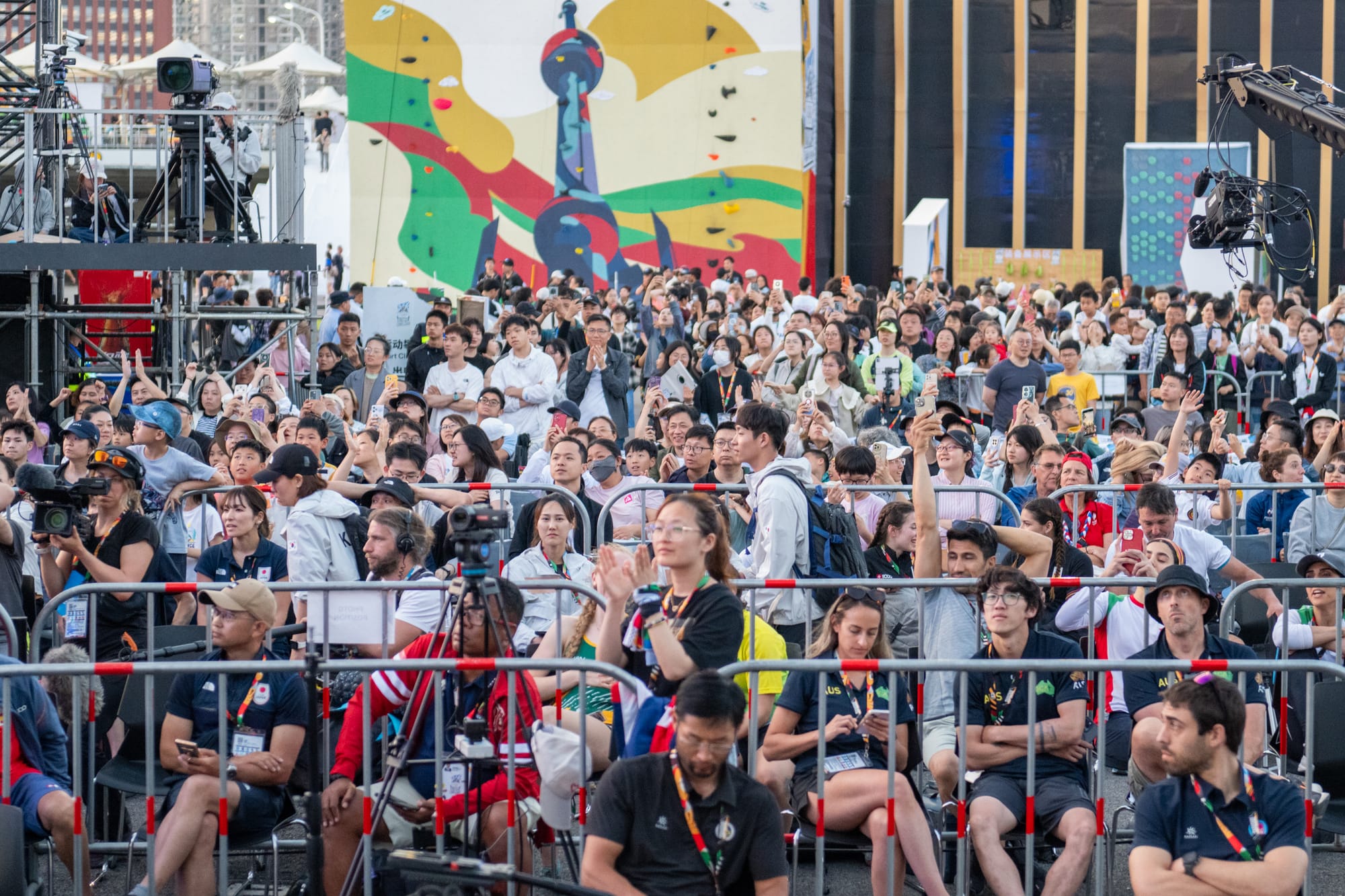
What You Need to Know
- Zhou Yafei (China) won the event ahead of Raji’ah Sallsabillah (Indonesia) in a personal best time of 6.53 seconds. Natalia Kalucka (Poland) came third, beating Nui Di (China) in the small final. Zhou has a 12-point lead going into Budapest over Nui Di, and N. Kalucka has a 9-point lead over her sister Aleksandra Kalucka.
- Veddriq Leonardo, the former World Record holder, won the event ahead of Wu Peng in the first-ever sub-4.90 race. Wang Xinshang (China) beat Yaraslov Tkach (Ukraine) for the third place. Both China and Indonesia can also only qualify one more male athlete for the Olympics, as Long Jinbao and Rahmad Adi Mulyono have already qualified. Veddrq has a 16-point lead, and Wu has a 4-point lead going into Budapest.
- Capucine Viglione finished 7th and set a new French record in 6.68 seconds. She only needs to finish in the top 36 to qualify for the Host country spot, which now looks very likely. If she finishes in the top 5 after accounting for country quotas, the host ticket is reallocated to the next highest athlete. As Bassa Mawem has already qualified for France, the Host nation’s Olympic ticket for Male Speed has already been reallocated to the next highest athlete at the OQS.
- As there are no Universality-eligible athletes in Speed, both tickets are reassigned to the next highest place in the OQS, meaning there are 7 tickets available for Male and Female Speed.
- Replays are available on the Olympic Channel for Speed Final and Speed Qualification. Full results can be found on the IFSC and the global standings on the Olympics for Male Speed and Female Speed.
Who is likely to win the Olympic Tickets?
In Shanghai and Budapest, the same athletes compete for up to 50 points towards the overall Series ranking, and the points are added together to give a total of 100. The total points from both events are used to rank athletes and decide who has won the Olympic tickets.
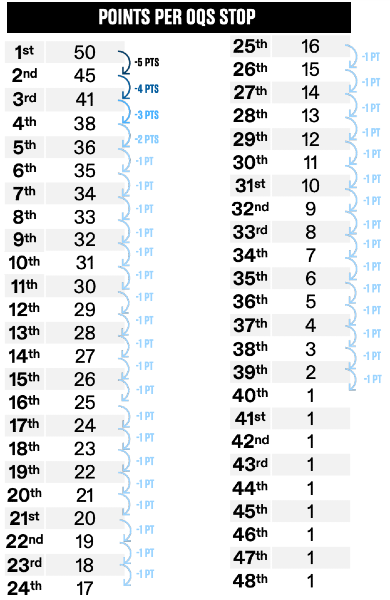
Because the Olympics wants to have a diverse selection of athletes, there are country quotas in climbing of two athletes per country and sex in Speed. A country can qualify with at most 2 male athletes and 2 female athletes. The USA has already qualified 2 female athletes, Emma Hunt and Piper Kelly, so no female athletes from the USA are competing in Speed. Some other countries have already qualified one athlete. Athletes from these countries are also competing against their teammates to finish ahead of them to win an Olympic ticket. For other countries, finishing in the top 12 gave them enough points to be in an Olympic Ticket spot after Shanghai.
In Male Speed, because China and Indonesia can only qualify one more athlete each, the 7 Olympic ticket spots, denoted by ⭐, would be distributed right now as
- Veddriq Leonardo (Indonesia) – 50 points ⭐
- Wu Peng (China) – 45 points ⭐
- Wang Xinshang (China) – 41 points
- Yaroslav Tkach (Ukraine) – 38 points ⭐
- Kiromal Katibin (Indonesia) – 36 points
- Reza Alipor Shenazandifard (Iran) – 35 points ⭐
- Zach Hammer (USA) – 34 points ⭐
- Aspar Aspar (Indonesia) – 33 points
- Long Jianguo (China) – 32 points
- Raharjati Nursamsa (Indonesia) – 31 points
- Amir Maimuratov (Kazakhstan) – 30 points ⭐
- Shin Euncheol (South Korea) – 29 points ⭐
- Zhang Liang (China) – 28 points
- Omasa Ryo (Japan) – 27 points
- Erik Cardona Noya (Spain) – 26 points
- Hryhorii Ilchyshyn (Ukraine) – 25 points
In Female Speed, Poland, China, and Indonesia can only qualify one more athlete each. The 7 Olympic tickets, denoted by ⭐, would be distributed right now as
- Zhou Yafei (China) – 50 points ⭐
- Raji’ah Sallsabillah (Indonesia) – 45 points ⭐
- Natalia Kalucka (Poland) – 41 points ⭐
- Nui Di (China) – 38 points
- Aleksandra Kalucka (Poland) – 36 points
- Jeong Jimin (South Korea) – 35 points ⭐
- Capucine Viglione (France) – 34 points ⭐
- Narda Mutia Amanda (Indonesia) – 33 points
- Wang Shengyan (China) – 32 points
- Zhang Shaoqin (China) – 31 points
- Beatrice Colli (Italy) – 30 points ⭐
- Leslie Romero Peréz (Spain) – 29 points ⭐
- Nurul Iqamah (Indonesia) – 28 points
- Lison Gautron (France) – 27 points
- Manon Lebon (France) – 26 points
- Giulia Randi (Italy) – 25 points
Of course, this can all change in Budapest.
Leonardo and Wu lead the way as both break 5-seconds
Both Leonardo and Wu are not just competing against other athletes for an Olympic ticket. They are also competing against their own teammates for the last Male Speed Olympic ticket. And the competition is stiff. All 4 Indonesian and Chinese athletes competing in the Male Speed competition reached the final.
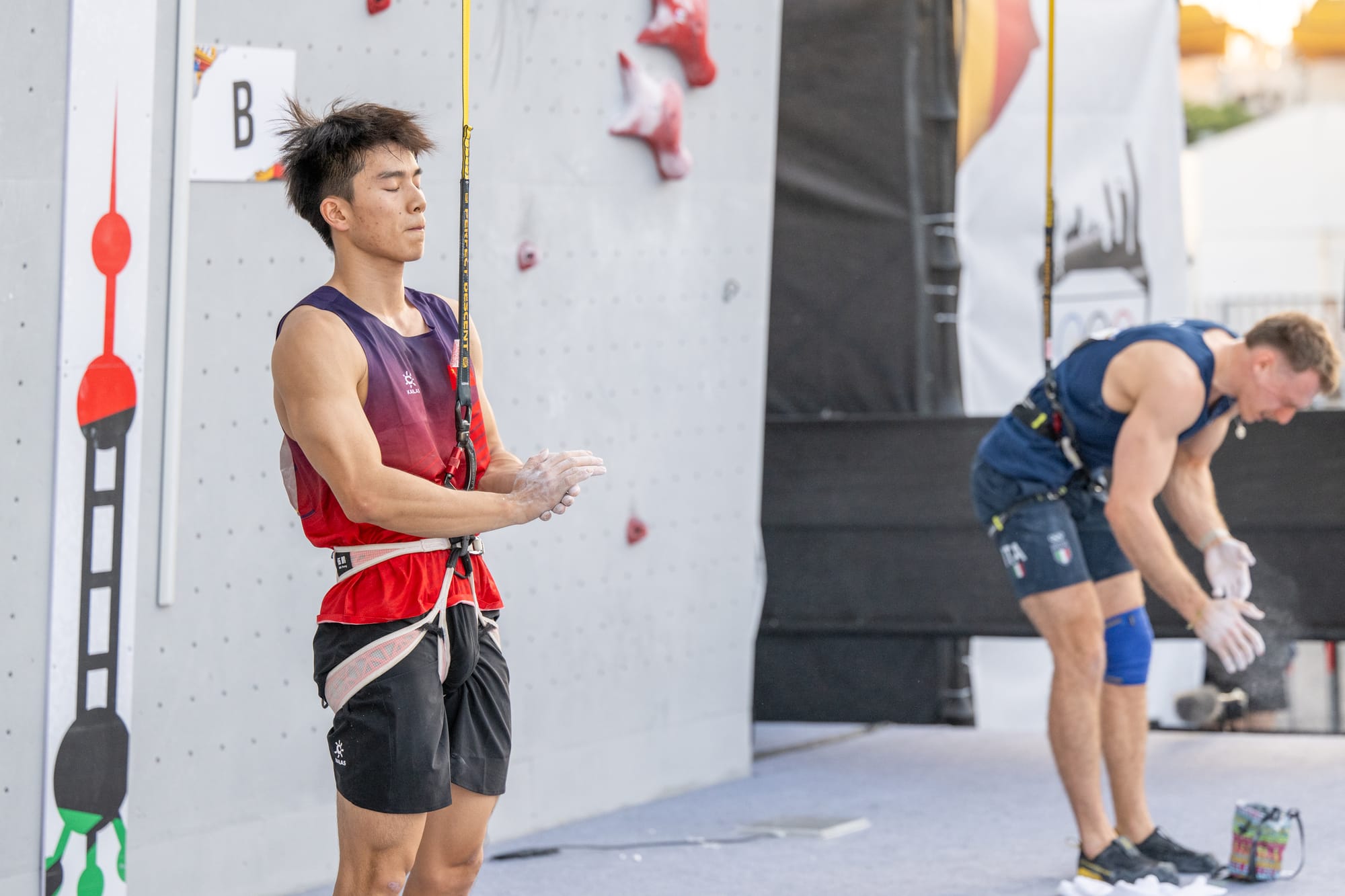
Wu set the fastest time in the qualification round at 4.94, ahead of Leonardo’s 4.95. Leonardo previously held the World Record with a time of 4.90 until the World Cup in Wujiang, China, when Sam Watson set a new World Record of 4.79. Wu set a new personal best and Asia Continental record of 4.86 at the same competition, which he went on to win.
Because of the bracket format, as long as each athlete won every race on their side of the bracket, they were going to race against each other in the final.
And they did. Wu would go under 5 seconds to beat previous World Record holder Reza Alipour Shenazandifard in the quarter-final. Leonardo would break his personal best time, finishing in 4.88 seconds, to beat Wang Xinshang in the semi-final setting up the race for the win between the fastest men in the competition.
And they delivered. Both ran under 4.90 seconds, Wu in 4.88 and Leonardo in 4.83 seconds, only 0.04 seconds slower than Sam Watson’s World Record.
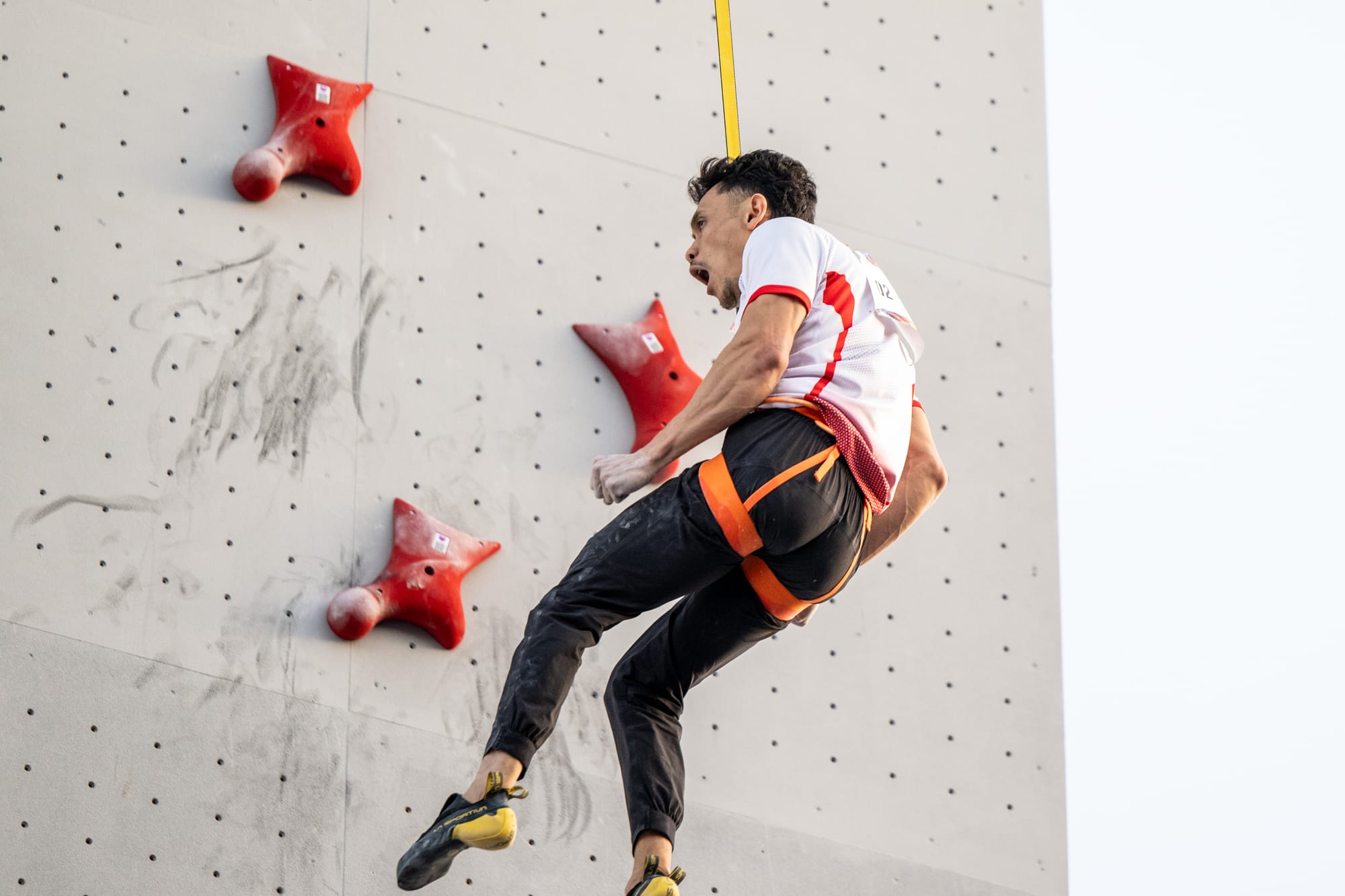
Leonardo said after the event, “I am happy. I have to qualify, so this is the first step. In Speed, even though you did well in practice, it doesn’t guarantee you a good result in competition.
I am competing among the best competitors and the best athletes in the world. The more good athletes there are in Speed Climbing, the better it is for the sport. I only focus on myself and my performance.
I have a very good relationship with the rest of the Indonesian team. We are like family. We train together. In this competition each of us tries to do our best and it’s our responsibility to bring the country’s name to the world level. Competing against each other is not a problem.”
Wu commented, “Veddriq is calm and he is competitive. And he is very self-disciplined and works very hard in training. I am a little bit afraid of the battle, I want to win.”
Finishing in the top two gives both of them the most points they could over their teammates, creating the largest buffer they could going into the second OQS event in Budapest.
Anything could still happen, including a false start in qualification, which would relegate either athlete to last place. They are both in strong positions, but Speed is known for being unpredictable.
Zhou Yafei surprises in Shanghai
No one would have predicted that Zhou Yafei would be walking away with the victory in Shanghai, beating World Cup medalists Nui Di and Raji’ah Sallsabillah on the way.
Zhou, aged 20, started competing on the World Cup circuit last year, and her highest rank was 6th in Wujiang in 2023. Wujiang was in her fifth final at a World Cup or World Championship in 2023, but she was only in the second top 8. At the Bern World Championship, she finished 8th, losing to Emma Hunt in the quarter-final, and she didn’t compete in Jakarta at the Asian Olympic Qualifier. Her personal best time was 6.957 going into the competition, far below the personal records of either Kalucka sister or Sallsabillah.
But she was a worthy winner in Shanghai. She had the second fastest time in qualification, finishing in 6.62, a new personal record, just behind Aleksandra Kalucka in 6.55. She would run under 6.9 seconds in every race in the final round, beating Narda Mutia Amanda in a close quarter-final race in 6.68 to 6.8 seconds. She would beat her compatriot Nui Di in the semi-final to race in the big final in 6.69. Nui was the fastest Chinese athlete going into the OQS series.
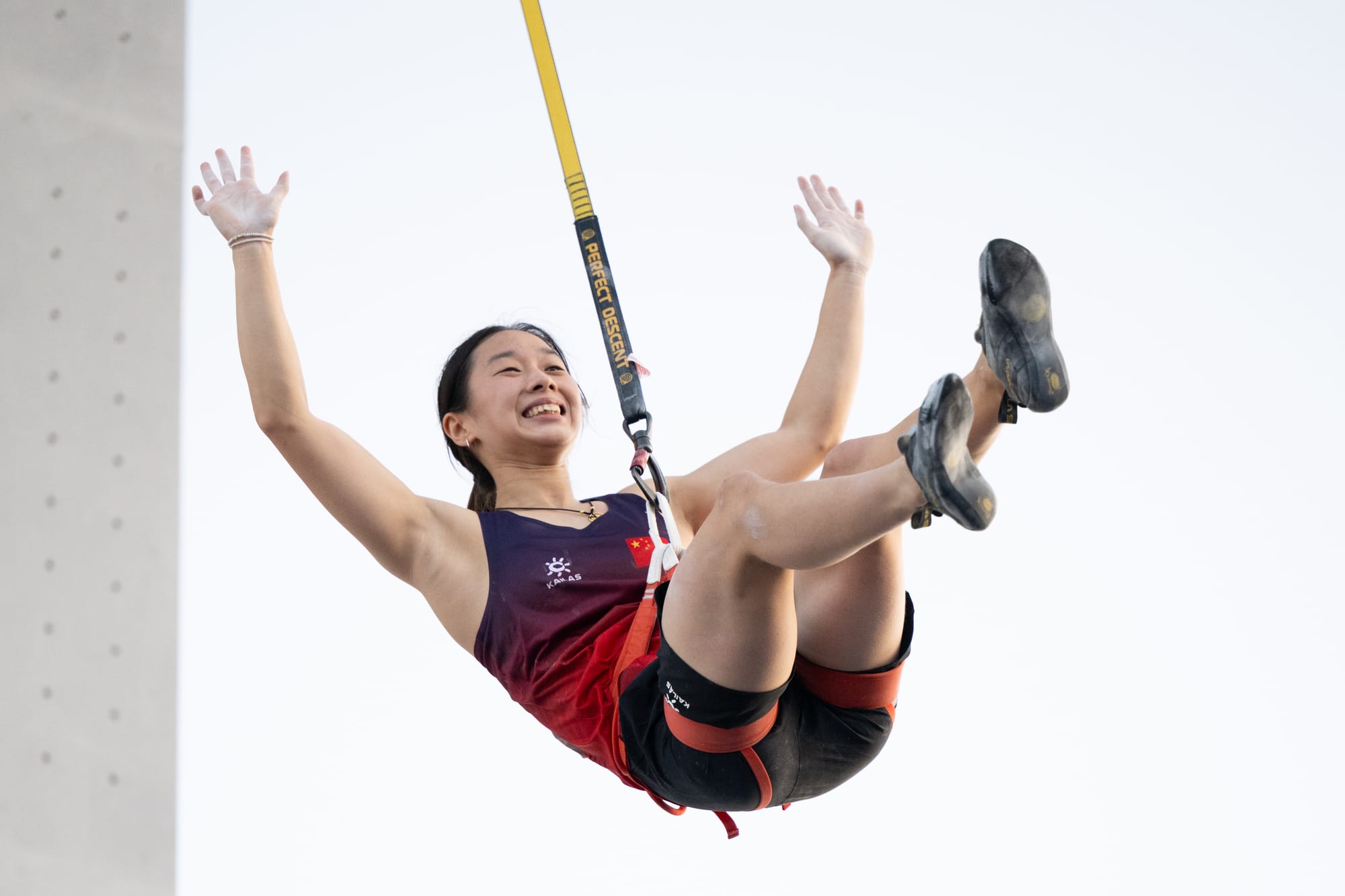
In the final, she then beat Raji’ah Sallsabillah in 6.54, the fastest race in the competition and a new personal best. The win means Zhou has a buffer of 12 points ahead of Nui Di in the competition for the final Chinese female Speed Olympic ticket, as Deng Lijuan has already qualified.
“I just performed like myself. I performed the way I do normally,” said Zhou after he event. “I tried to focus on every single climb, on every single run I had to do today. I did feel nervous, but I tried to block out the noise that came from the spectators. I felt I just had to focus on myself. I just thought about the action, about the things I had to do.”
Kalucka Sisters Race for the final Poland Olympic ticket
The country quota rules of 2 tickets per country are the cruellest for the twin sisters, Aleksandra and Natalia Kalucka. Only one of them can win an Olympic ticket through the OQS, as the World Record holder Aleksandra Miroslaw has already won her Olympic ticket.
Both were born prematurely on Christmas day while the doctors fought for their lives. The doctors predicted afterwards that they would have limited function. This didn’t stop them.
In 2021, Natalia won the Speed World Championship. In 2022, Aleksandra won the World Cup Speed Series after finishing in the top 3 in 6 out of 7 events and winning the Edinburgh World Cup.
At the Bern World Championship, Natalia finished 9th after falling in her first race of the final round against Zhou Yafei. Aleksandra progressed further, finishing 4th behind her compatriot Miroslaw after losing to Desak Made Rita Kusuma Dewi in the semi-final. At the European Qualifier, Natalia finished 3rd, and Aleksandra 2nd behind Miroslaw as Poland swept the podium.
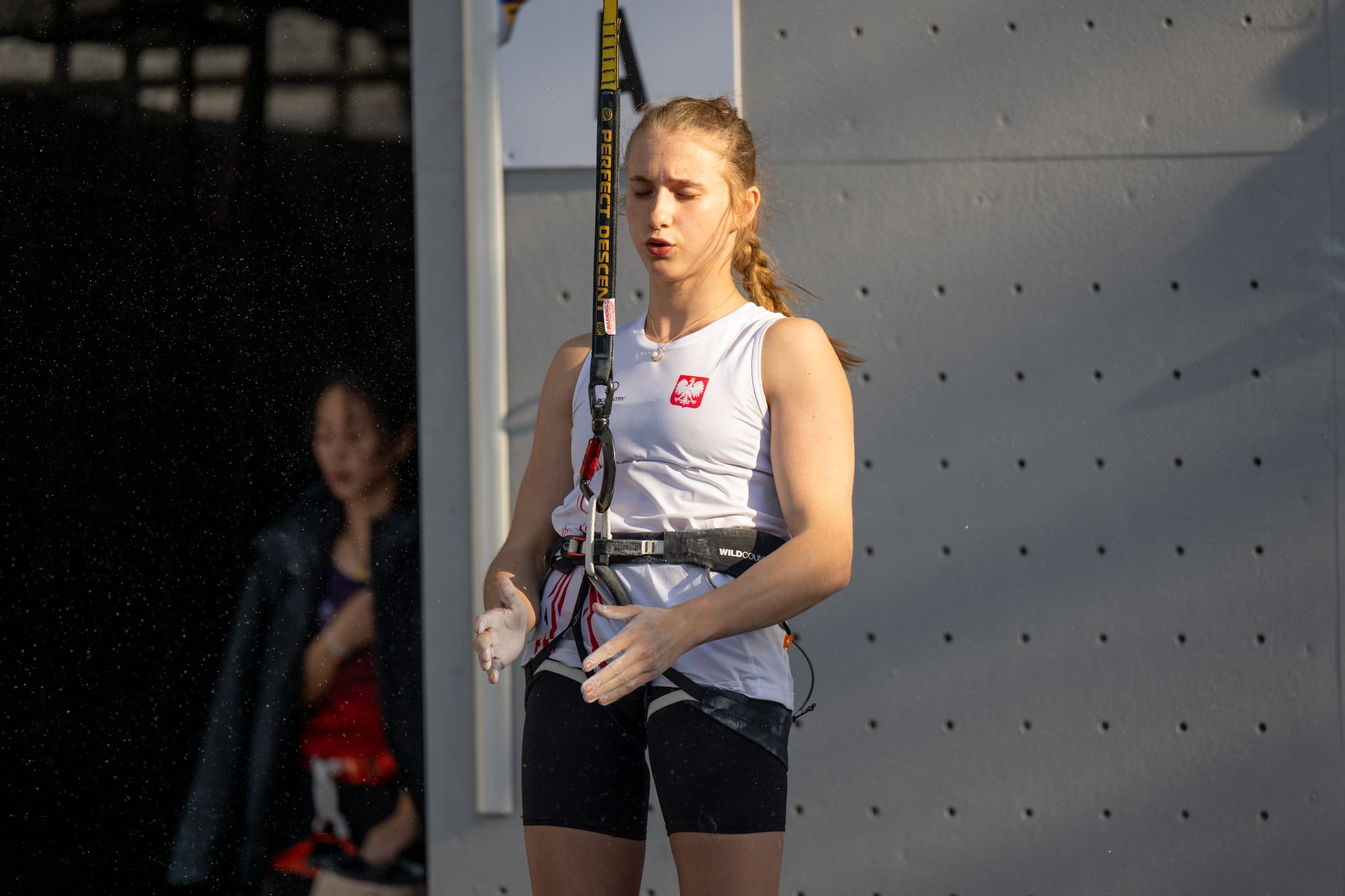
Aleksandra started stronger in Shanghai, winning the qualification round with the fastest time of 6.55, while Natalia started slower, finishing 5th in qualification in 6.77. Both sisters would lose to Raj’iah Sallbillah in the final round, Aleksandra in the quarter-final race and Natalia in the semi-final race by only one-hundredth of a second. Natalia would finish third by beating Nui Di in the small final race.
N. Kalucka said after the event, “This is a very hard situation for us because I am so happy, and she is very sad. To be honest this year she was faster than me. The pressure was very hard for her. But I guess in the future, in the second qualification event, she will show her best. Sport is sometimes very brutal for athletes. My family is the most important thing and my sister is very important for me. She gives me power in the competition.”
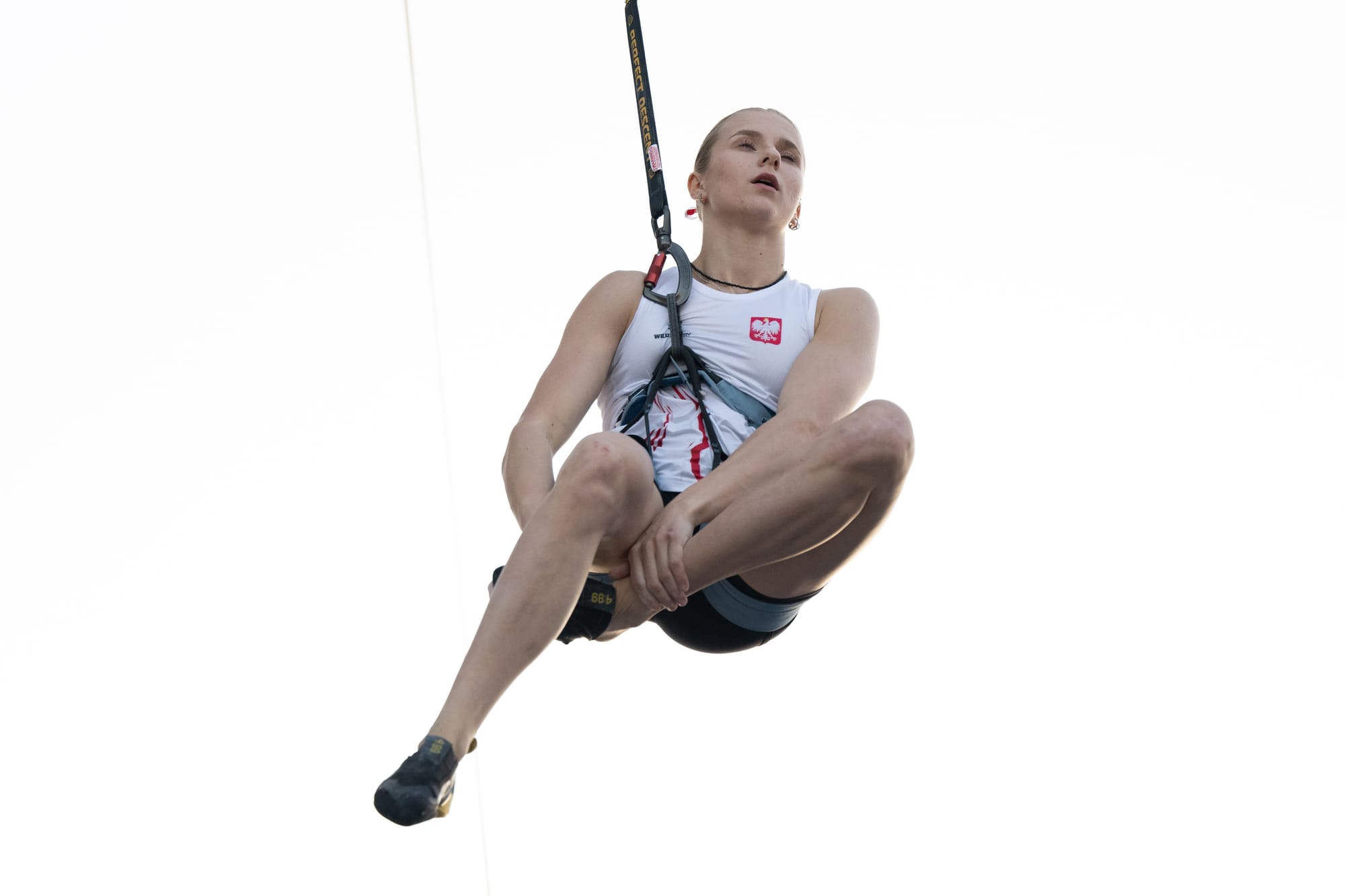
Natalia’s third place gives her a 5-point lead over her sister going into Budapest, but anything can and will happen in Speed.
For some, “pressure is a privilege”, for others, it’s a curse
We saw many athletes thrive under pressure in Shanghai, setting new personal best times and breaking national records.
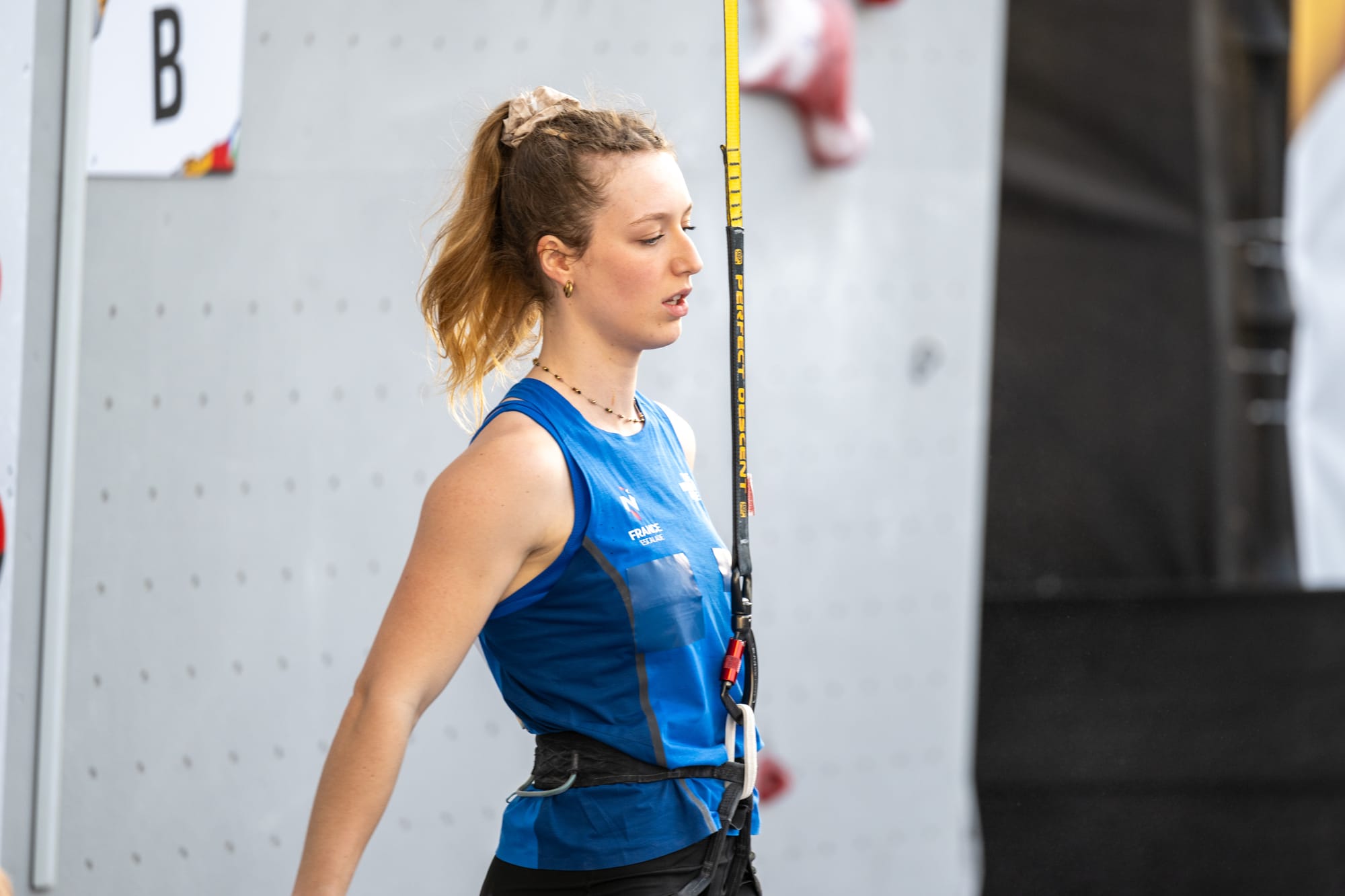
Capucine Viglione set a new French record at 6.68 on her way to 7th overall and put in a prime position to win the host Olympic ticket. Shin Euncheol set a new South Korean record of 5.09, and Reza Alipour Shenazandifard set a new Iranian record of 5.04. Yaroslav Tkach set a new Ukrainian record in 5.09, and Erik Noya Cardona set a new Spanish record in 5.20.
Tkach commented after qualification, “Physically and mentally, I feel good, in perfect condition. The most difficult part was to get into the top 16, after that you just need to do clean rounds in the final. The wall is super good, very fast, a lot of athletes made their personal bests today.”
Though Zach Hammer and Kiromal Katibin didn’t set new national records, they both set new personal records in 5.17 and 4.90.
Hammer said after the qualification round, “I was really just trying to treat that as any other competition because that’s what it is. I was having fun and that’s when I climb my best. In qualifications whenever you have a good first lap it just really takes the pressure off the second lap. So, I was really just trying to enjoy the second lap. It is the same thing I do every day in training, so I try to have that mindset of ‘I have done this a thousand times’.
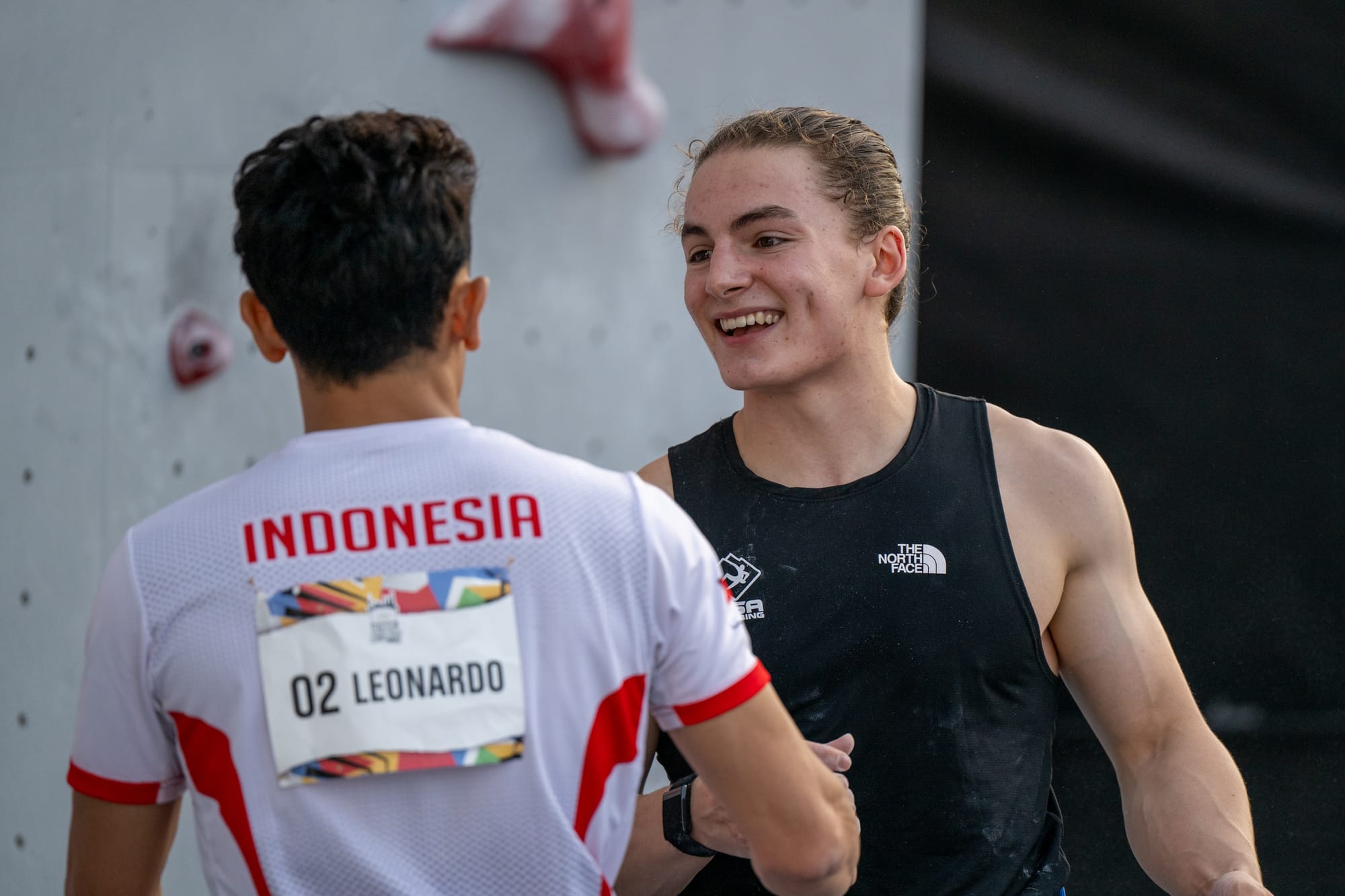
“It is kind of fun. I like racing Chinese and Indonesian climbers. They are very fast. It helps push you. I think I can beat them.
“John Brosler and I live in Salt Lake City together and Noah Bratschi has been in Salt Lake City for the past month training with us. I have not talked to them a ton but it is always rough when you do not have a good competition. It is rough when your teammates do not do well, I want them to do well. But it’s not over, There is still another competition in Budapest.”
For others, the pressure took its toll. Neither John Brosler nor 2020 Olympican Rishat Kaibulin had a clean run in qualification, finishing 31st and 32nd. Patrycja Chudziak false started as the first athlete out in qualification, finishing last with 9 points in the competition.
Both Guillaume Moro and Franziska Ritter just missed out on the finals by the narrowest of margins, Moro by 0.01 and Ritter by 0.03 seconds. Moro had thought he was in the finals as he descended.
The pressure will only rise in Budapest as we move towards awarding the Olympic tickets on Olympic Day, June 23. For some, this will push them even faster; for others, the pressure will be their undoing.





